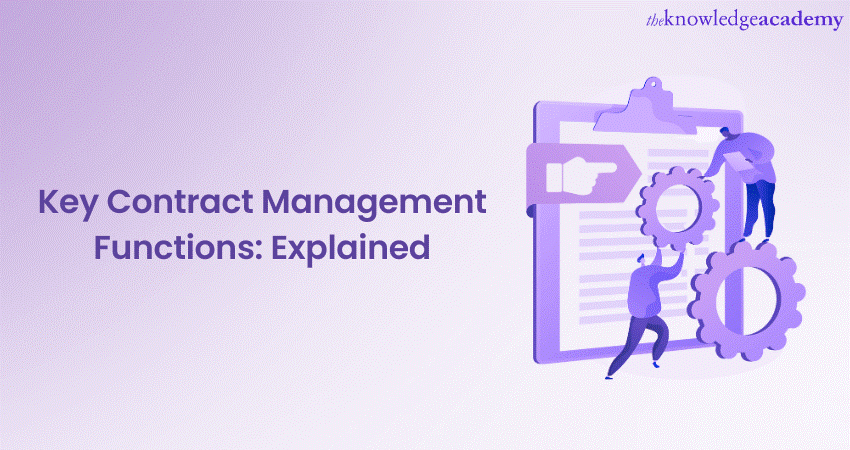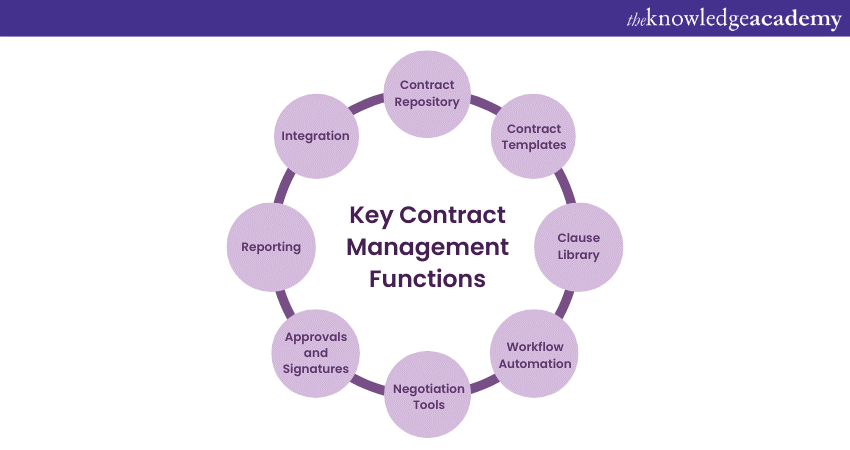We may not have the course you’re looking for. If you enquire or give us a call on 01344203999 and speak to our training experts, we may still be able to help with your training requirements.
Training Outcomes Within Your Budget!
We ensure quality, budget-alignment, and timely delivery by our expert instructors.

Contracts are crucial in modern organisations as they legally bind agreements between parties. Contract Management involves overseeing the entire process, from initiation to execution. Various software solutions offer Contract Management Functions that assist companies in drafting, negotiating, and managing contracts.
According to MarketsandMarkets, the global Contract Management software market is expected to be worth £ 2.3 billion by 2024. This rapidly growing market has made Contract Management a prevalent domain, and more and more people want to learn about the different functions Contract Management software provides. This blog will help you understand all you need to know about the key Contract Management Functions.
Table of Contents
1) A Brief Introduction to Contract Management
2) Key Contract Management Functions
a) Contract Repository
b) Contract Templates
c) Clause Library
d) Workflow Automation
e) Negotiation Tools
f) Approvals and Signatures
g) Reporting
h) Integration
3) Conclusion
A Brief Introduction to Contract Management
Contract Management could be defined as the practice of managing contracts from the moment they are created to when they are completed and eventually to their termination. Contract Management Functions include examining Key Performance Indicators (KPIs) against contract terms to ensure the maximum operational, financial and supply chain performance.
Contract Management features help organisations create, negotiate and manage contractual agreements. When used efficiently, Contract Management can prevent risk during the contract process, ensure compliance, increase productivity and improve end-to-end visibility so all parties involved are informed.
Many contracting processes involve two or more parties, vendors and buyers in Contract Lifecycle Management. Some Contract Management functions such as contract repository, contract templates, clause library, workplace automation, negotiation tools, approvals and signatures, reporting and integration help organisations streamline the process of Contract Management.
Contract Management demands that Contract Managers and legal teams determine ways to simplify complex and time-consuming Contract Management processes. This streamlining helps prevent procurement risks and mitigate any risks that arise in the procurement lifecycle stages.
Sign up for our Contract Management Training course and gain the skills to manage, create and implement contracts successfully!
Key Contract Management Functions

This section of the blog will focus on key Contract Management Functions, all of which will be discussed in detail below:
Contract Repository
Contract Management software can be a central contract repository throughout the Contract Management Lifecycle. The most efficient Contract Repository features let one add metadata such as the customer’s name, the content’s date of creation, and when the parties signed the agreement.
The feature of adding meta tags helps people locate contracts more conveniently. The full-text feature offers additional functionality, allowing employees to search for contracts by keywords, clauses and other elements in a contract.
Role-based security features offer access to authorised individuals while restricting others from accessing sensitive data or documents in the repository. Storing contracts in the cloud decreases the need for excessive e-mails and paper documents.
Contract Templates
Many organisations use the same types of contracts in repeated intervals. Contract Management software that allows one to create and manage pre-approved templates streamlines the contract authoring process. This assists organisations in enforcing their standardised language across organisations.
Clause Library
Clause Libraries assist legal teams in developing pre-approved language that makes contract creation and negotiation processes more efficient. For instance, when legal teams develop contract templates, the process is often as simple as selecting clauses from the Clause Library and arranging them appropriately.
Another instance is when an outside party will not accept the terms in a specific clause. The clause library can provide alternate language written specifically for these repeatable situations and is immediately available.
Workflow Automation
Contracts often take winding ways before all sides agree on a final version. The more complex a contract is, the more time internal and external parties spend reviewing the document.
Contract Management software that includes workflow automation makes tracking the process and automating certain aspects of contact creation simpler. At each negotiation stage, events can begin automated workflows that increase efficiency, restrict bottlenecks, and ensure everyone is updated with the latest information.
Negotiation Tools
High-value and complex contracts can require several negotiation rounds. With each stage, parties draw closer to an acceptable agreement. However, the more complex a contract is, the more time it takes for parties to review agreements, talk to their legal teams, and project how the contract will affect them in the future.
Contract Management software that keeps track of every change made to the contract helps all parties understand the evolution of the document over time. Instead of reading every line in a contract, attention could be drawn to focus on recent revisions only.
The software can store all versions of a contract, so it is feasible for individuals and organisations to review past versions. The document’s history stored in a central repository helps all parties stay updated on changes to reach an agreement quickly.
Approvals and Signatures
Each organisation follows a slightly different approach to approving and signing contracts. In some cases, the approval process may require signatures from several people, further complicating the agreement's finalisation.
An excellent Contract Management software system has the flexibility to correspond to each organisation’s existing practices. The software can also help simplify the process by moving the contract forward through every stage. If someone rejects a change, the contract remains in the negotiation phase.
When the process moves forward again, the management software tracks that progress and alerts the authorised parties of any changes. Alerts inform every party about the contract’s progress and prevent delays. Since everyone is alerted, no one can claim they were unaware of recent revisions.
Once all the parties complete their negotiations, the contract is moved to a secure cloud repository where every party can provide their electronic signatures. Keeping the contract in the cloud repository makes the process shorter, requiring fewer e-mails, scans and uploads. One also benefits from reducing the amount of paper and ink traditionally needed to complete a contract.
Reporting
Contract Management software provides an organisation with important insights into its contract process. When one uses paper contracts, finding discrepancies that prevent the organisation from improving its processes is tougher. However, with the right software, an organisation can access a report that includes objective data. This can optimise the contract process, improve partner relationships and potentially increase revenue.
The reports may include data points such as the number of times a contract was revised, whether the contractual obligations were met, and which vendors prefer non-standard clauses. This information makes it possible for an organisation to detect patterns that will inform future negotiations better.
Integration
Modern-day organisations rely on several software applications to run their daily operations. Customer Relationship Management (CRM), Enterprise Resource Planning (ERP), electronic signature and supply chain solutions are common instances. By integrating these modern technologies with its Contract Management system, an organisation gets deeper insights, saves money, increases efficiency and enables smarter decision-making.
Conclusion
All in all, Contract Management software is important for most businesses. Given the benefits we have listed of the key Contract Management Functions in this blog, you should also know that the world of Contract Management software is an ever-evolving blend of technology, trends and best practices. If your organisation counts on contracts to function, you are advised to consider getting Contract Management Software in place to stay updated with the latest digital trends.
Learn all you need to know about being an effective and efficient contract manager by signing up for our Contract Management Certification Training courses!
Frequently Asked Questions
Upcoming ISO & Compliance Resources Batches & Dates
Date
 Contract Management Certification Training
Contract Management Certification Training
Thu 11th Jul 2024
Thu 19th Sep 2024
Thu 12th Dec 2024







 Top Rated Course
Top Rated Course



 If you wish to make any changes to your course, please
If you wish to make any changes to your course, please


